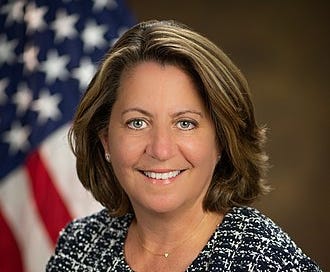Justice Behind the Scenes
How one person, unknown to most, shapes Justice Deparment operations.
One of my most memorable moments working as an Assistant United States Attorney occurred when Attorney General Michael Mukasey visited the office. This was “the” boss. The United States Attorney General sits at the top of the Justice Department’s hierarchy. The Attorney General is nationally known, appears on the news. And…he was coming to my office!
While the Attorney General sits at the top of the hierachy and is the face of the Department, the Attorney General does not oversee the Department’s daily operations. Instead, the Deputy Attorney General, or DAG, handles the Department’s daily functions. If the Attorney General is the Department’s public face, the DAG is the Department’s backbone. While the Attorney General is well known, the DAG maintains a lower profile.
Though operating behind the scenes, holding the Deputy Attorney General position boosts one’s career. Congress created the Deputy Attorney General post during Harry Truman’s presidency. Peyton Ford, who resisted pressure to turn over government personnel records to the House Committee on UnAmerican Acitivites, served as the first DAG. Like most DAG’s, he returned to private practice after leaving government. Several, however, ascended to Attorney General. Others became judges, one—Byron White—was confirmed as a Supreme Court Justice.
Currently, Lisa Monaco serves as the Justice Department’s Deputy Attorney General. She is the fourth woman to serve in the post. Her road to the post included numerous federal government stops. Following her graduation from the University of Chicago’s law school, Monaco clerked for a federal judge and then moved to the Justice Department to serve as counsel to then Bill Clinton Attorney General Janet Reno. Following George W. Bush’s election as President, Monaco transitioned to the US Attorney’s Office for the District of Columbia. She earned recognition as part of the Enron Task Force. When that work concluded, she moved to the FBI, serving as counsel then chief of staff for Director Robert Mueller. In 2009, after two years with the FBI, Monaco returned to the Justice Department as Associate Deputy Attorney General and then Assistant Attorney General for the National Security Division. The latter assignment was her first presidentially appointed position. After four years at Justice, Monaco moved to the White House as President Obama’s chief homeland security advisor. She handled issues related to terrorism, cybersecurity, and public health. In 2017, she left government to become a news analyst. She also became a partner at a large law firm. During 2020, she assisted with candidate Joe Biden’s presidential campaign, eventually earning the Deputy Attorney General nomination with his victory.
Monaco’s top priorities are corporate crime and national security. One of the most important decisions prosecutors make in both areas is which cases to prosecute. Prosecuting a corporation and/or its leadership can severely damage the corporation and the innocent people it employs. Yet the corporation and its leadership must be held accountable. The Deputy Attorney General is responsible for establishing that line. National security cases present a similar dilemma. In those instances, she must work with investigators and the intelligence community to decide if and when national security information will be disclosed to enable a prosecution.
Her work in these areas demonstrates a tension within federal criminal prosecution. The Justice Department does more than decide which cases to investigate and prosecute. It also sets policy in accordance with the President’s overall agenda. Monaco highlighted this distinction in a March 2023 address to the Council on Foreign Relations. “It is an independent prosecutor and investigator. But it also has a policy role in our government. And it’s got to do both of those. It has to pursue the president’s policy priorities, consistent with the law. But has to do so while exercising its independent prosecution and investigative responsibilities.” (Monaco, 2023). Like the decisions on corporate and national security prosecutions, where the line is drawn between the Department’s prosecutorial and policy roles can vary depending on who is making the decision. What one person sees as an improper political prosecution, another might see as enforcing the president’s policy agenda. Setting that line implicates what I call the politics of prosecution, a topic I will address more fully throughout November.
When making these decisions, Monaco brings a career’s worth of Justice Department experience. Not every Deputy Attorney General possessed her ecperience. Under Barack Obama, James Cole served as DAG from 2010 to 2015. His only previous Justice Department experience was as a prosecutor in the late 1980s and early 1990s. Similarly, Laurence Silberman, who served as DAG under Richard Nixon at the end of Nixon’s presidency and would become a US Ambassador and federal judge, had never worked for the Justice Department prior to his appointment. These previous professional experiences shape both the office holder’s perception and understanding of the work federal prosecutors perform. Those entering with prosecutorial experience will be more sensitive to the job’s prosecutorial aspects and less aligned with the political influences.
Ultimately, the DAG plays the leading role in setting daily prosecutorial and policy priorities. The DAG sets the line between politics and prosecution. Yet the DAG does this behind the scenes, leaving the Attorney General free to visit various United States Attorney’s Offices and serve as the Department’s public face.
I hope you enjoyed this issue and that it made you stop and think. I would love to hear any comments, questions, concerns, or criticisms that you have. Leave a comment or send a message! Also, if you enjoyed this or if it challenged your thinking, please subscribe and share with others!
Sources
Council on Foreign Relations, “A Conversation with Deputy U.S. Attorney General Lisa Monaco: Defending the Rule of Law Against Hostile Nation States.” March 28, 2023.




